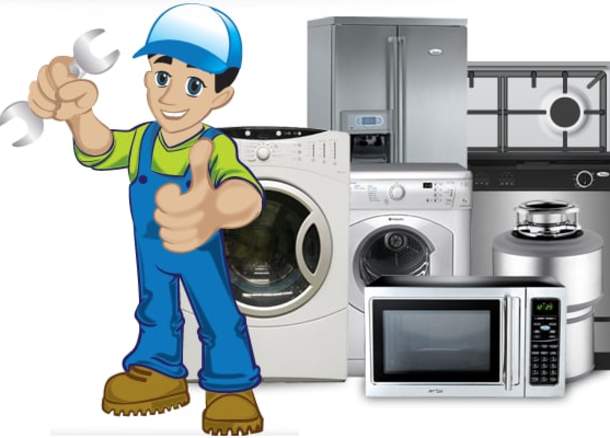Get Rid of Moldy Washer Smell – Maytag Washing machine repair Dependable Refrigeration & Appliance Repair Service
Get Rid of Moldy Washer Smell – Maytag Washing machine repair Dependable Refrigeration & Appliance Repair Service
Blog Article
The Ultimate Guide to Comprehending Home Appliance Fixing in the house
When your refrigerator quits cooling down or your stove rejects to warm, it can feel frustrating. Comprehending home appliance repair in your home can save you money and time. You'll find out to identify signs and symptoms, make use of necessary tools, and follow an organized troubleshooting procedure. Before you start, there are important security precautions you need to take right into account. What are the most usual troubles, and how can you fix them? Allow's check out the fundamentals.
Typical Device Problems and Their Signs
When your home appliances begin breaking down, it's necessary to acknowledge the indicators early on. Disregarding them can bring about larger problems and costly fixings. If your fridge isn't cooling appropriately, you could see warm areas or condensation forming. This might suggest a falling short compressor or an obstructed vent.Your dishwasher might reveal troubles via unclean recipes or unusual noises during cycles. If you hear grinding or clanking, it's time to investigate.A cleaning maker that will not spin or drain can leave you with soaked laundry, suggesting a stopped up drainpipe or a malfunctioning pump.Lastly, if your oven's temperature seems off or it takes for life to preheat, you could be handling a malfunctioning thermostat. By remaining alert to these signs, you can deal with problems before they escalate right into significant fixings.
Vital Devices for Appliance Fixing
When you're dealing with device repairs at home, having the right tools is important. Fundamental hand devices like screwdrivers and pliers will certainly assist you take apart and take care of different home appliances, while electric screening devices assure you're working safely with circuitry. Allow's discuss what you require to get started on your repair work journey.
Basic Hand Tools
Having the right tools is necessary for efficient appliance fixing in your home. Begin with a dependable screwdriver set, consisting of both flathead and Phillips types, as screws are usual in device assembly. Pliers are likewise important; they aid with gripping, twisting, and reducing cables or tiny elements. A pair of needle-nose pliers can reach difficult situations conveniently. You'll need a good adjustable wrench for tightening or loosening up nuts and bolts. An energy blade is convenient for reducing through product packaging or insulation. Don't neglect a strong workbench or surface to safely organize your devices and components. With these basic hand devices, you'll be well-prepared to take on most device repair work that come your way.
Electrical Screening Devices
Along with basic hand tools, electrical screening tools play a necessary duty in appliance repair service. These devices help you diagnose electric problems and assurance devices function safely. A multimeter is vital; it measures voltage, current, and resistance, permitting you to determine problems swiftly. A non-contact voltage tester is one more must-have, allowing you identify live cords without making straight call, boosting your security. Secure meters are great for measuring current flow in cords without separating them, conserving you time and initiative. Furthermore, circuit testers can promptly check if electrical outlets are working appropriately. By using these tools, you'll streamline your troubleshooting procedure and enhance your repair abilities, making device upkeep a whole lot less complicated.
Step-by-Step Guide to Diagnosing Appliance Issues
When your device breaks down, it can be aggravating, but diagnosing the problem does not have to be frustrating. You'll find out to identify usual troubles and use effective fixing techniques. Let's go through the actions to get your device back in functioning order.
Typical Device Troubles

Fixing Strategies Described

Fixing Significant Kitchen Area Home Appliances: A Closer Look
Have you ever asked yourself exactly how to take on usual issues with your cooking area home appliances? Fixing major kitchen devices like refrigerators, stoves, and dishwashers can be simpler than you believe. Start by recognizing the issue-- whether it's a fridge not cooling down or a stove that won't heat up. Typically, a straightforward reset or examining the source of power can address the issue.For fridges, tidy the condenser coils and inspect the door seals. If your oven's not heating, check the home heating element and thermostat. Dishwashing machines could just need a clean filter or a reset to get them back in activity. Constantly unplug the device before diving into repair services to ensure your safety.Don' t neglect to get in touch with the user handbook for certain repairing tips connected to your model. With a little bit of perseverance and the right tools, you can with confidence tackle home appliance repair work and save cash in the procedure!

Repairing Washing Appliances: Tips and Techniques
When your washing devices begin acting up, it can feel overwhelming, but troubleshooting them doesn't need to be a headache. Beginning by checking the power supply. Verify the home appliance is connected in and the outlet is working. Next, evaluate the door or lid switch; a defective button can prevent the device from operating.For washers, if it's not rotating, inspect for out of balance loads. Rearranging the clothes could solve the issue. If your dryer isn't home heating, tidy the dust filter and inspect the air vent for blockages.Listen for unusual sounds; they can suggest an issue. If your device is leaking, examine the tubes for splits or loosened connections. File any type of mistake codes shown on electronic screens, as they can direct you in determining the concern. Seek advice from the customer handbook for specific fixing tips connected to your design.
Safety Preventative Measures to Take During Fixes
Before you start any appliance repairs, it's vital to prioritize safety and security to protect against crashes or injuries. Disconnect the device or turn off the circuit breaker to assure no power reaches it while you work. Use shielded devices to reduce the danger of electrical shock. Wear security goggles and gloves to protect on your own from sharp sides or debris (Dependable Refrigeration & Appliance Repair Service Washing Machine Repair).Make certain your workspace is tidy and well-lit, so you can see what you're doing. Keep kids and pet dogs far from the location to prevent diversions and prospective risks. If you're taking care of gas home appliances, be additional cautious; look for leaks before proceeding.Take your time, and don't hurry via repairs. If you really feel unsure regarding any action, it's better to stop and study than to guess. Following these preventative measures will certainly aid produce a safer setting for your DIY device repair task
When to Call a Specialist for Help
Just how do you know if it's time to contact a professional for home appliance repair services? If you've tried standard troubleshooting without success, it's a clear indication. If your device still won't start or shows unusual sounds after resetting home it, don't wait to look for specialist help.When you discover leakages, smoke, or burning scents, prioritize safety and security and call a professional immediately. These problems can cause even more substantial damage or pose dangers to your home.Also, if your device is under warranty, speaking to a this page professional is commonly the most effective course. They can ensure that fixings won't void your warranty, saving you cash in the lengthy run.Finally, if you're not sure or uneasy with complicated fixings, it's wise to leave it to the specialists. Remember, dealing with complicated issues without the appropriate know-how can bring about costly mistakes. Depend on an expert when in doubt!
Often Asked Questions
Just How Can I Stop Home Appliance Issues in the Future?
To stop device issues in the future, you must execute normal upkeep, check for deterioration, clean filters, and stay clear of overloading. Remaining aggressive will aid expand their life expectancy and keep them running smoothly.
What Are one of the most Typical DIY Home Appliance Fixing Mistakes?
You could neglect safety and security precautions, miss fixing steps, or make use of incorrect devices when attempting do it yourself appliance repair work. Rushing the procedure or ignoring manufacturer standards can cause more substantial problems and pricey blunders. Stay client and informed!
Just how Do I Know if a Part Demands Replacement?
You can tell if a part requires replacement by looking for unusual sounds, leaks, or inconsistent efficiency. If the device struggles to run correctly or reveals visible damage, it's likely time for a substitute.
Can I Utilize Generic Parts for Home Appliance Services?
Yes, you can utilize common parts for appliance fixings, yet ascertain they work - Dependable Refrigeration & Appliance Repair Service Washer repair near me. Generic parts could conserve you cash, however they might affect efficiency or longevity, so evaluate your options very carefully prior to deciding
What Guarantees Cover Home Appliance Fixes?
The majority of appliance guarantees cover repair services for manufacturing problems, however they frequently omit damage from abuse. Inspect your warranty terms carefully, as some might call for using certified professionals and initial components for protection to stay legitimate.
Report this page